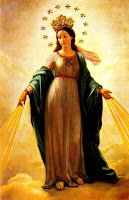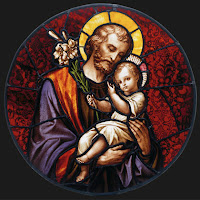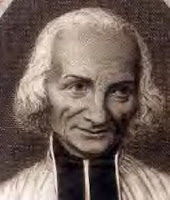 |
| Mother of God |
PRAISED BE JESUS, MARY, AND JOSEPH!
Feng Shui masters are the stars
of the moment. I have always said that New Year’s Eve is perhaps the most
superstitious night of the year because people are so obsessed with
appropriating for themselves the power that does not belong to them, that is,
the power to influence the elements of nature to their own advantage. But be
careful of harnessing these so-called “powers” for these are not simple
energies. Rather, they are what St. Paul calls the “principalities and powers,
rulers of the world of this darkness, the spirits of wickedness in high
places.” (Eph. 6:12) In other words, these are demons who will do all they can
to deceive you into believing that they can assure you of a good future only if
you do their bidding. Remember that our Lord himself was promised by Satan all
the kingdoms of the earth if only he bows down to worship the devil. Many say
that there is no harm in trying what to them seem to be innocent rituals. “Wala
namang mawawala,” we always say. But we are wrong. Mayroong mawawala at iyan ay
ang pananampalataya natin at pagtitiwala sa Diyos.
In fact, superstition steals away
freedom and joy. Underneath the noise and merry making is fear and slavery. We
are enslaved to the performance of these rituals because failure to do them
might cause bad luck in the coming year. We are not conscious of it but we are
actually compelled to have the 12 fruits on the table, to light firecrackers,
to wear polkadots…all by the fear of ill luck. Father, you might says, hindi
totoo yan…hindi kami napipilitan ng takot. Talaga? Sige nga, hinahamon ko kayo,
kung talagang hindi kayo takot, pagsapit ng hatinggabi, huwag ninyo gawin ang
lahat ng iyan at maglakas loob lang kayo na magtiwala sa Diyos. Magagawa ninyo?
I challenge you to be truly Catholic tonight…to put your faith in action…to
trust God’s love for you.
I found these tips for feng shui in
the home and honestly, I think they are all a load of crap. But I will share
them with you to point out what is the more Catholic way of doing it.
Clean it up!
Instead of just cleaning your house, why don’t you come
clean before the Lord? Confess your sins and reconcile with your enemies. Start
the year with a clean slate.
Be colorful!
I do not see how Red brings power, and green brings in
wealth. Ano naman ang kinalaman ng kulay sa kapalaran? Instead of putting your
trust in colors that have no powers at all to bring in fortune, why don’t you
just allow God, family, and friends to put color into your life? Allow their
friendship to bring meaning to your life.
Serve a spread!
How will a media noche feast,
composed of meat, fish, and vegetable dishes and different types of fruits and
cakes on the dining table, bring in prosperity and good luck? How can making
sure that having leftovers of each will assure you will not run out of food the
rest of the year? Go instead to Mass and receive Communion worthily. The Body
of Christ is the Feast that God prepares for his people.
Go fruity!
At ano naman talaga ang kinalaman
ng 12 different fruits: Pineapples, oranges, apples, grapes, bananas, mangoes,
lemons, watermelons, papaya, lychees, avocadoes, and pomelosa kapalaran? How
will the combination of these fruits bring about good fortune, harmony,
happiness, prosperity, happiness, good fortune, and good health? Instead of
being preoccupied with these 12 fruits, why not be preoccupied with bearing the
12 fruits of the Holy Spirit: charity, joy, peace, patience, kindness,
goodness, generosity, gentleness, faithfulness, modesty, self-control,
chastity. These are permanent dispositions which make man docile in obeying the
promptings of the Holy Spirit.
Check it!
Leaky faucets will not bring
about leaks in your finances; nor will burned out bulbs bring poor “chi” flow. There
is simply no relationship between them. Instead, engage in an examination of
conscience tonight. Measure your life
against the 10 commandments and the 8
beatitudes. Examine the leakages in your relationship with God, meaning, those
graces which you did not put into use for your salvation and those of others.
See red!
How can giving ampao, those red
envelopes with gold Chinese characters, with some money inside bring protection
and good luck? Instead, give to the poor. Donate to charities. Instead, think
of those who are hungry tonight. Think of those who have suffered because of
the storm. Share your food with the hungry. Charity covers a multitude of sins.
Make noise!
Blowing on your torotot and
whistles, banging on those pot covers will not drive away evil spirits. Believe
me, it does not work this way. I know what I am talking about. Evil spirits are
driven away by prayer and fasting. That is why, tonight, it is better to pray.
Sing hymns and canticles to God. Make joyful noise unto the Lord.
In the end will always be a disclaimer: kailangang samahan ito ng panalangin, pananampalataya, sipag at tiyaga in order to give a senseless report on geomancy some credibility to modern observers. I always say: if there is faith, effort, and patience, what do you need geomancy for? Feng shui compromises faith. It is an expression of lack of trust in the providence of God.
Tonight, let us imitate the
Blessed Virgin Mary who kept all these things, reflecting on them in her heart.
New Year’s Eve need not be expensive and dangerous. Libre at ligtas ang
manalangin. Ang pagkakawanggawa ay nagdudulot ng kapatawaran ng kasalanan. Ang
Panginoon lang ang nagdudulot ng kaligtasan.
Jesus, I trust in you. O Mary
conceived without sin, pray for us who have recourse to thee!

























